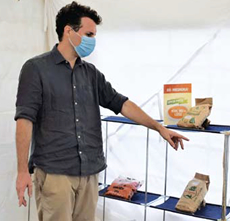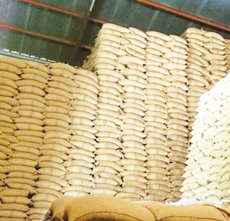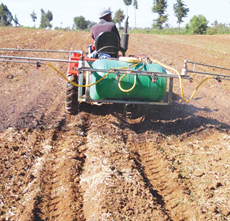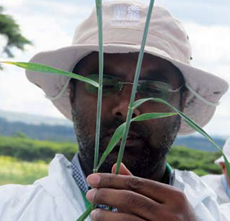Buying into New Seed
 Mary Nzau enters a mock agrodealer shop set up on a field on the outskirts of Tala town in Machakos County, Kenya. On display are nine 2kg bags of hybrid maize seed. She picks one. By the look of it, her mind is made up. After a quick scan of the shelf, she has in her hand the variety that she has been purchasing for years.
Mary Nzau enters a mock agrodealer shop set up on a field on the outskirts of Tala town in Machakos County, Kenya. On display are nine 2kg bags of hybrid maize seed. She picks one. By the look of it, her mind is made up. After a quick scan of the shelf, she has in her hand the variety that she has been purchasing for years.
Regina Mbaika Mutua is less lucky. The variety she always buys is not on display in the mock shop. As part of the experiment, the research team has removed from the shelf the variety she indicated she usually buys. The team’s goal is to observe what factors influence her seed purchase decision in the absence of the variety she was expecting to purchase.
“Although I did not find the variety I was looking for, I picked an alternative as I have seen it perform well on a neighbouring farm,” Mutua says, adding that she will plant it this season alongside recycled (farm-saved) seed on her one-acre farm.
 Fertilizers can increase crop yields. This not only offers important benefits for farmer incomes and food security, but also produces environmental benefits by reducing our demands for farmland. Many countries would benefit from using more fertilizer.
Fertilizers can increase crop yields. This not only offers important benefits for farmer incomes and food security, but also produces environmental benefits by reducing our demands for farmland. Many countries would benefit from using more fertilizer. Integrated Weed Management (IWM) is a comprehensive method to control and mitigate infestation in fields incorporating diverse techniques. The oldest way to tackle the problem is manual pulling. Yet, it is labor and time consuming due to vast areas and short staff.
Integrated Weed Management (IWM) is a comprehensive method to control and mitigate infestation in fields incorporating diverse techniques. The oldest way to tackle the problem is manual pulling. Yet, it is labor and time consuming due to vast areas and short staff. Farmers in Kenya are very enterprising and hardworking people. This explains why there are numerous different projects that people are willing to try out.
Farmers in Kenya are very enterprising and hardworking people. This explains why there are numerous different projects that people are willing to try out. Change is constant, but at this moment the pace and breadth in agriculture is unprecedented. With the biggest change in domestic policy in the UK since the Second World War combined with extreme weather events, trade agreements and global pandemics farming can seem very daunting. As individuals we have to take control and drive our own destiny without waiting to be told.
Change is constant, but at this moment the pace and breadth in agriculture is unprecedented. With the biggest change in domestic policy in the UK since the Second World War combined with extreme weather events, trade agreements and global pandemics farming can seem very daunting. As individuals we have to take control and drive our own destiny without waiting to be told.